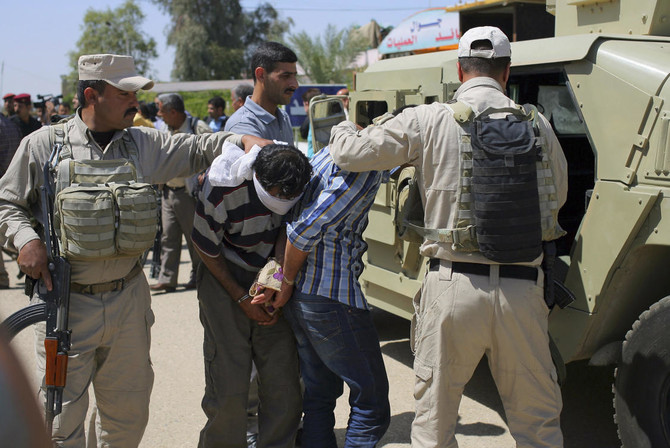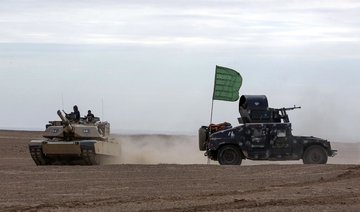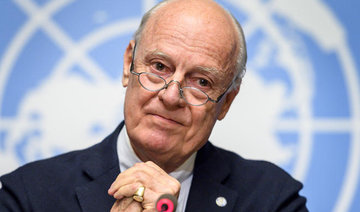BAGHDAD: Thousands of people suspected of having ties to the Daesh group are facing widespread rights violations in Iraqi custody, Human Rights watch said Tuesday.
The New York-based rights group said some 20,000 people are believed to be in Iraqi custody on suspicion of ties to Daesh. Many are held in inhumane detention facilities and not granted due process, according to the watchdog’s 76-page report, based on information gathered in Baghdad and northern Iraq from November 2016 to July 2017.
Iraq’s Prime Minister Haider Al-Abadi dismissed the report, saying much of its findings were “unverified” and that Human Rights Watch should devote more attention to the crimes committed by the extremists.
As Iraqi ground forces backed by the US-led coalition have slowly retaken nearly all of the territory once held by Daesh, thousands of men, women and children suspected of having ties to the group have been arrested and detained.
The prisoners have overwhelmed Iraq’s already weak judicial system.
Screening processes are flawed, many detainees are being held in inhumane conditions and suspects are largely being tried under broad counterterrorism laws with harsh sentences, the report said.
An innocent person wrongfully identified as an Daesh member in the screening process “may spend months in mass arbitrary detention during the course of their judicial investigation,” the group found.
Prosecuting Daesh suspects under Iraq’s counterterrorism laws is “easier,” Human Rights Watch said, as a court would only need to prove membership in Daesh, rather than establish that individual acts violated Iraqi criminal codes.
Under counterterrorism laws, Iraqi authorities can sentence people who worked as doctors or cooks within Daesh with the same harsh penalties — including death or life in prison — as Daesh members who carried out violent acts, the report said.
“This approach makes it less likely that the process will establish a more comprehensive judicial record of the crimes committed,” Human Rights Watch warned, ultimately depriving Daesh victims of justice and potentially undermining future attempts at reconciliation in Iraq.
Rights group: Daesh suspects face violations in Iraqi custody
Rights group: Daesh suspects face violations in Iraqi custody

Tens of thousands of Palestinians flee West Bank refugee camps

- The camps, built for descendants of Palestinian refugees who fled or were driven from their homes in the 1948 war around the creation of the state of Israel, have long been major centers for armed militant groups
JERUSALEM: Tens of thousands of Palestinians living in refugee camps in the occupied West Bank have left their homes as a weeks-long Israeli offensive has demolished houses and torn up vital infrastructure in the heavily built up townships, Palestinian authorities said.
Israeli forces began their operation in the refugee camp in the northern West Bank city of Jenin on Jan. 21, deploying hundreds of troops and bulldozers that demolished houses and dug up roads, driving almost all of the camp’s residents out.
“We don’t know what’s going on in the camp but there is continuous demolition and roads being dug up,” said Mohammed Al-Sabbagh, head of the Jenin camp services committee.

The operation, which Israel says is aimed at thwarting Iranian-backed militant groups in the West Bank, has since been extended to other camps, notably the Tulkarm refugee camp and the nearby Nur Shams camp, both of which have also been devastated. The camps, built for descendants of Palestinian refugees who fled or were driven from their homes in the 1948 war around the creation of the state of Israel, have long been major centers for armed militant groups. They have been raided repeatedly by the Israeli military but the current operation, which began as a ceasefire was agreed in Gaza, has been on an unusually large scale. According to figures from the Palestinian Authority, around 17,000 people have now left Jenin refugee camp, leaving the site almost completely deserted, while in Nur Shams 6,000 people, or about two thirds of the total, have left, with another 10,000 leaving from Tulkarm camp.
“The ones who are left are trapped,” said Nihad Al-Shawish, head of the Nur Shams camp services committee. “The Civil Defense, the Red Crescent and the Palestinian security forces brought them some food yesterday but the army is still bulldozing and destroying the camp.” The Israeli raids have demolished dozens of houses and torn up large stretches of roadway as well as cutting off water and power, but the military has denied forcing residents to leave their homes.
“People obviously have the possibility to move or go where they want, if they will. But if they don’t, they’re allowed to stay,” Lt. Col. Nadav Shoshani told reporters.
The operation began as Israel moved to banish the main UN Palestinian relief organization UNRWA from its headquarters in East Jerusalem and cut it off from any contact with Israeli officials.
The ban, which took effect at the end of January, has hit UNRWA’s work in the West Bank and Gaza, where it provides aid for millions of Palestinians in the refugee camps.
Israel has accused UNRWA of cooperating with Hamas and said some UNRWA workers even took part in the Hamas-led attack on communities in southern Israel on Oct. 7, 2023 that set off the 15-month war in Gaza.
More than one million Syrians return to their homes: UN

- “Since the fall of the regime in Syria we estimate that 280,000 Syrian refugees and more than 800,000 people displaced inside the country have returned to their homes,” Filippo Grandi, the UN High Commissioner for Refugees
GENEVA: More than one million people have returned to their homes in Syria after the overthrow of Bashar Assad, including 280,000 refugees who came back from abroad, the UN said on Tuesday.
Assad was toppled in December in a rebel offensive, putting an end to his family’s decades-long grip on power in the Middle Eastern country and bookmarking a civil war that broke out in 2011, with the brutal repression of anti-government protests.
Syria’s war has killed more than half a million people and displaced millions from their homes.
The Islamist-led rebels whose offensive ousted Assad have sought to assure the international community that they have broken with their past and will respect the rights of minorities.
“Since the fall of the regime in Syria we estimate that 280,000 Syrian refugees and more than 800,000 people displaced inside the country have returned to their homes,” Filippo Grandi, the UN High Commissioner for Refugees, wrote on the X social media platform.
“Early recovery efforts must be bolder and faster, though, otherwise people will leave again: this is now urgent!” he said.
At a meeting in Paris in mid-February, some 20 countries, including Arab nations, Turkiye, Britain, France, Germany, Canada and Japan agreed at the close of a conference in Paris to “work together to ensure the success of the transition in a process led by Syria.”
The meeting’s final statement also pledged support for Syria’s new authorities in the fight against “all forms of terrorism and extremism.”
Algiers slams French minister’s visit to W. Sahara

- France’s stance on Western Sahara has been ambiguous in recent years, often straining its ties with Morocco
ALGIERS: Algeria on Tuesday denounced a visit by French Culture Minister Rachida Dati to Western Sahara, after Paris recognized Moroccan sovereignty over the disputed territory, as “objectionable on multiple levels.”
The vast desert territory is a former Spanish colony largely controlled by Morocco but claimed for decades by the Algeria-backed Polisario Front.
Dati, who described her visit as “historic,” launched with Moroccan Culture Minister Mohamed Mehdi Bensaid a French cultural mission in the territory’s main city, Laayoune.
An Algerian foreign ministry statement posted on social media Tuesday said the visit “reflects blatant disregard for international legality by a permanent member of the UN Security Council.”
“This visit reinforces Morocco’s fait accompli in Western Sahara, a territory where the decolonization process remains incomplete and the right to self-determination unfulfilled,” it said.
Dati’s trip, a first for a French official, “reflects the detestable image of a former colonial power in solidarity with a new one,” the statement added.
The United Nations considers Western Sahara to be a “non-self-governing territory” and has had a peacekeeping mission there since 1991, whose stated aim is to organize a referendum on the territory’s future.
But Rabat has repeatedly rejected any vote in which independence is an option, instead proposing autonomy under Morocco.
France’s stance on Western Sahara has been ambiguous in recent years, often straining its ties with Morocco.
But in July, French President Emmanuel Macron said Rabat’s autonomy plan was the “only basis” to resolve the Western Sahara dispute.
Algeria has backed the separatist Polisario Front and cut diplomatic relations with Rabat in 2021 — the year after Morocco normalized ties with Israel under a deal that awarded it US recognition of its annexation of the Western Sahara.
In October, the UN Security Council called for parties to “resume negotiations” to reach a “lasting and mutually acceptable solution” to the Western Sahara dispute.
In November 2020, the Polisario Front said it was ending a 29-year ceasefire with Morocco after Moroccan troops were deployed to the far south of the territory to remove independence supporters blocking the only road to Mauritania.
The Polisario Front claims the route is illegal, arguing that it did not exist when the ceasefire was established in 1991.
Kurdistan region’s pipeline restart ready to go, foreign minister says

- Baghdad has periodically withheld the Kurdistan region’s share of the federal budget to try to stop it from exporting oil independently
BAGHDAD: A major pipeline connecting Iraq’s semi-autonomous Kurdistan region to Turkiye is ready to reopen and resume exports, the Kurdish foreign minister said on Tuesday, potentially ending a dispute between Baghdad and Irbil that led to the closure of the pipeline in 2023.
Foreign Minister Safeen Dizayee declined to say when the pipeline would reopen but said it would mark a turning point in relations between Kurdistan and Baghdad.
Iraq’s oil minister said on Monday the Iraq-Turkiye pipeline (ITP) will resume next week.
“All arrangements that were set on the table have been agreed to, with the aim to prepare for re-exports. There shouldn’t be any hiccups. The legal aspects have been met, the technical aspects are in place,” Dizayee told Reuters by phone. “The button just has to be pushed to increase production and then re-export.”
The oil flows were halted by Turkiye in March 2023 after the International Chamber of Commerce ordered Ankara to pay Baghdad damages of $1.5 billion for unauthorized pipeline exports by the Kurdistan Regional Government between 2014 and 2018.
Negotiations to restart the pipeline have been ongoing, with US officials participating in some of the talks.
Resuming oil exports will boost the Kurdistan region’s budget, Dizayee said.
“This means Kurdistan will benefit from the federal budget and hopefully this will end the saga of (civil servants’) salaries coming or not coming, received in dribs and drabs,” Dizayee said.
Baghdad has periodically withheld the Kurdistan region’s share of the federal budget to try to stop it from exporting oil independently.
Oil producers in the Kurdistan region have had to wind down production without an export route. It will likely take some time for them to restart their oil wells and for the pipeline to use its full capacity. Before it was shut down, it transported around 450,000 barrels per day.
“They’ve invested a lot. It was a risk they took and it must pay off. They [the companies] need assurances that their investment will not be down the drain,” Dizayee said. “Compensation is something that needs to be discussed.”
An international consultancy will be brought in to do an assessment of the cost of production, expenses, cost recovery and the production sharing agreements, he said.






















